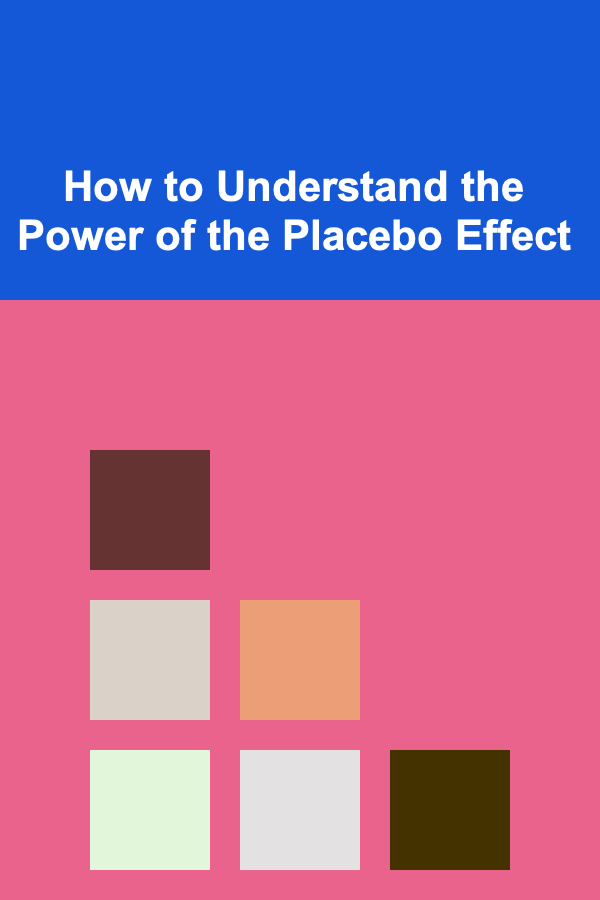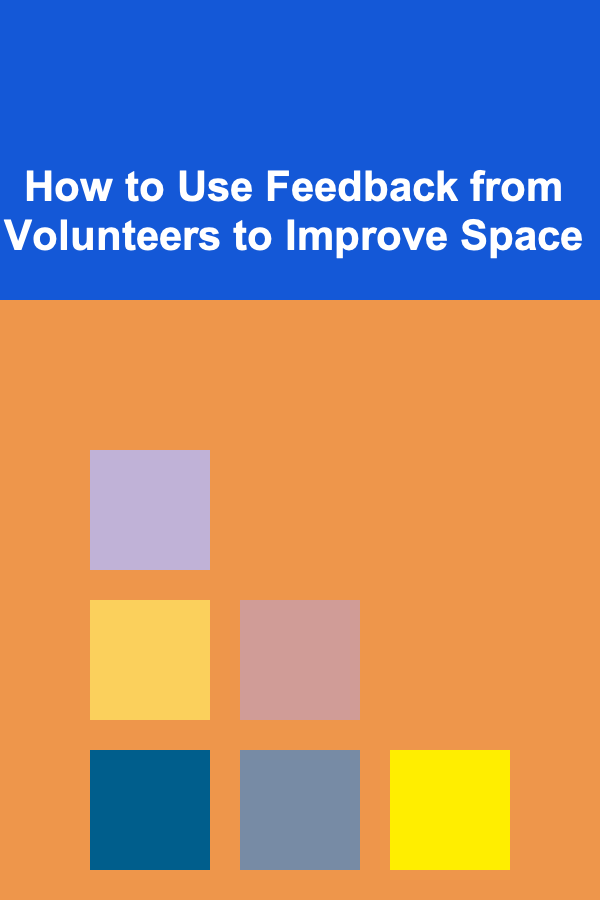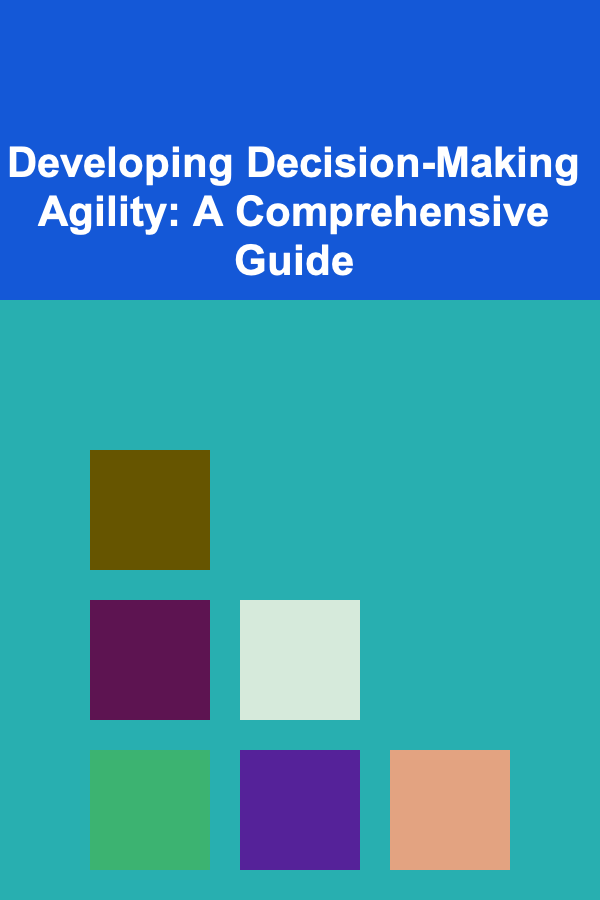
How to Understand the Power of the Placebo Effect
ebook include PDF & Audio bundle (Micro Guide)
$12.99$10.99
Limited Time Offer! Order within the next:

The placebo effect is a fascinating and paradoxical phenomenon in which individuals experience real changes in their health after receiving an inactive substance or treatment, which they believe is effective. While the term "placebo" is commonly associated with sugar pills or inert treatments, the placebo effect extends far beyond just the substances administered. It encompasses the mind-body connection and the complex ways in which our beliefs, expectations, and psychological states can influence our physical well-being. To understand the power of the placebo effect, we need to delve into its mechanisms, its historical background, and its implications for modern medicine and society.
The Psychological Foundations of the Placebo Effect
At the core of the placebo effect lies the profound influence that the mind has over the body. Psychological factors, such as beliefs, expectations, and emotional states, have the power to alter biological processes, leading to tangible changes in symptoms, health, and well-being. The placebo effect demonstrates how perceptions of treatment can have an actual impact on the outcome of an illness, even when no active medical intervention occurs.
The brain is a powerful organ, capable of influencing the body in remarkable ways. When an individual believes they are receiving an effective treatment, their brain activates certain pathways that can produce physical responses. For instance, the expectation of relief can trigger the release of neurotransmitters, such as endorphins, dopamine, and serotonin, which can help reduce pain, alleviate symptoms, and improve overall well-being. This process is often referred to as the "expectancy effect."
In many cases, the mind's expectations are so strong that they can mimic the effects of actual medical treatments. This can be seen in studies where patients report improvements in their condition after taking an inactive substance, simply because they believe it is working. This suggests that the brain can essentially "trick" the body into believing that healing is occurring, even when no physical treatment has been administered.
The History of the Placebo Effect
The concept of the placebo effect dates back centuries, with early instances of "placebos" being used in medical practice long before the term itself came into existence. Historically, the use of placebos was not always seen as an ethical issue. In fact, during ancient times, physicians would often prescribe "remedies" that were little more than comforting words or simple rituals.
The term "placebo" itself originates from the Latin word "placebo," meaning "I shall please." It was originally used to describe the act of giving a patient a treatment simply to satisfy their expectations or to provide psychological comfort, even if the treatment had no real therapeutic effect. It was only in the 18th and 19th centuries that the placebo effect began to gain more formal recognition, especially with the advent of modern scientific experimentation and the rise of the randomized controlled trial (RCT).
The use of placebos in clinical trials became particularly important in the 20th century, as researchers sought to establish the efficacy of new treatments. It was through the use of control groups that received placebos alongside experimental groups that the placebo effect was first formally studied and understood. This shift in research methodology allowed scientists to examine the psychological mechanisms behind the placebo effect, and to assess the extent to which patient expectations could influence clinical outcomes.
The Mechanisms Behind the Placebo Effect
The placebo effect is not just about belief alone; it involves a complex interaction between the brain, the nervous system, and the body's biological processes. Several mechanisms have been proposed to explain how the placebo effect works, each of which highlights the intricate relationship between the mind and body.
1. Expectancy and the Brain's Reward System
One of the most well-documented mechanisms behind the placebo effect involves the brain's reward system. When an individual expects to feel better after receiving a treatment, their brain anticipates the reward of healing. This expectation triggers the release of neurotransmitters such as dopamine, which play a crucial role in pleasure, motivation, and reward.
In studies of pain management, for example, patients who believe they are receiving a pain-relieving treatment may experience actual reductions in pain due to the activation of the brain's reward circuits. Even though the treatment itself has no pharmacological effect, the brain responds as if it were receiving a genuine therapeutic benefit.
2. Conditioning and Classical Conditioning
Another important mechanism in the placebo effect is classical conditioning. This process occurs when individuals associate a specific treatment with a positive outcome, such as relief from symptoms or healing. Over time, the mere act of receiving treatment, even if it is inert, can trigger the same physiological response as the active treatment it is associated with.
A classic example of this can be seen in patients who receive pain relief after taking a placebo pill. If the individual has previously taken an actual painkiller and experienced relief, their brain may come to associate the pill-taking ritual with relief, even when the pill contains no active ingredients. This conditioned response is a powerful factor in the placebo effect, as it demonstrates how previous experiences shape expectations and influence the body's response.
3. The Role of the Mind-Body Connection
The mind-body connection is a key aspect of the placebo effect. Our thoughts, emotions, and psychological states have a direct influence on our physical health. The body's stress response, for instance, can be modulated by positive emotional states and a sense of hope. The placebo effect can work through this connection, with a person's positive expectations leading to real physiological changes that contribute to healing.
Furthermore, the brain has the capacity to reduce negative symptoms, such as pain, anxiety, and nausea, through psychological mechanisms alone. In some cases, a person's belief in the effectiveness of a treatment can activate the body's self-healing processes, making the placebo effect a potent tool for symptom management, particularly in chronic conditions.
4. Social and Contextual Factors
The context in which a placebo is administered can also have a significant impact on its effectiveness. For example, the doctor-patient relationship plays a crucial role in the placebo effect. When patients trust their healthcare provider and believe that they are receiving the best possible treatment, they are more likely to experience positive outcomes, even when the treatment is a placebo.
Similarly, the setting in which a treatment is given can influence the placebo effect. Studies have shown that treatments administered in a clinical environment with professional medical staff are often more effective than those given in informal settings. The atmosphere of care and the patient's belief in the legitimacy of the treatment can enhance the power of the placebo.
Ethical Considerations of the Placebo Effect
The use of the placebo effect in modern medicine raises several important ethical questions. While the placebo effect can lead to real improvements in patient health, its use in clinical practice can be controversial. The primary ethical issue revolves around informed consent --- the idea that patients should be fully aware of the treatments they are receiving and the potential risks and benefits.
In some cases, physicians have used placebos without informing the patient, believing that it is in the best interest of the patient's well-being. This approach, known as "deceptive placebo use," has been debated extensively. Critics argue that deceiving patients violates their autonomy and trust in the medical profession. On the other hand, some proponents believe that in certain circumstances, the potential benefits of the placebo effect outweigh the ethical concerns.
Today, most medical ethics guidelines emphasize the importance of transparency and informed consent. However, there are situations where the use of placebos may still be permissible, such as in clinical trials where placebos are used as a control group to assess the efficacy of new treatments.
The Placebo Effect in Modern Medicine
The placebo effect continues to be an important consideration in modern medicine, particularly in the context of clinical trials. When new treatments are tested, placebo-controlled studies are considered the gold standard for determining the effectiveness of the treatment. By comparing the effects of a placebo with those of an active treatment, researchers can determine whether the benefits of the new treatment are due to the active ingredients or the psychological influence of the placebo.
The placebo effect also plays a role in the treatment of various conditions, especially those with a psychological or subjective component. For example, conditions such as chronic pain, depression, and anxiety often respond well to placebo treatments, as the psychological aspects of these conditions are deeply intertwined with the placebo effect. While placebo treatments should not replace evidence-based medical interventions, they can serve as an adjunct to other forms of therapy, particularly when traditional treatments are not effective.
In recent years, researchers have also explored the use of "open-label" placebos, in which patients are told that they are receiving a placebo. Studies have shown that open-label placebos can still produce significant therapeutic effects, even when patients are fully aware that the treatment is inert. This challenges traditional notions of the placebo effect and suggests that the mind's influence on the body can be harnessed in a more transparent and ethical manner.
Conclusion: The Profound Power of the Placebo Effect
The placebo effect is a testament to the profound power of the mind in influencing physical health. It underscores the importance of belief, expectation, and the mind-body connection in shaping our experiences of illness and recovery. While the placebo effect is often associated with deceptive practices or inert treatments, it is, in fact, a valuable tool for understanding how our psychological states can drive real changes in our well-being.
As research into the placebo effect continues, it offers new insights into the complex ways in which the brain and body interact. By exploring the mechanisms behind this phenomenon, we can better understand how to harness its power to improve patient care and treatment outcomes. Ultimately, the placebo effect serves as a reminder that healing is not just a physical process, but a deeply psychological one as well.

How to Create a Functional Mudroom for Your Family
Read More
How to Create a Party Supplies Checklist for DIY Craft Parties
Read More
How to Use a Whiteboard for Weekly Meal Planning
Read More
How to Use Feedback from Volunteers to Improve Space
Read More
How To Write Effective White Papers: A Comprehensive Guide
Read More
Developing Decision-Making Agility: A Comprehensive Guide
Read MoreOther Products

How to Create a Functional Mudroom for Your Family
Read More
How to Create a Party Supplies Checklist for DIY Craft Parties
Read More
How to Use a Whiteboard for Weekly Meal Planning
Read More
How to Use Feedback from Volunteers to Improve Space
Read More
How To Write Effective White Papers: A Comprehensive Guide
Read More